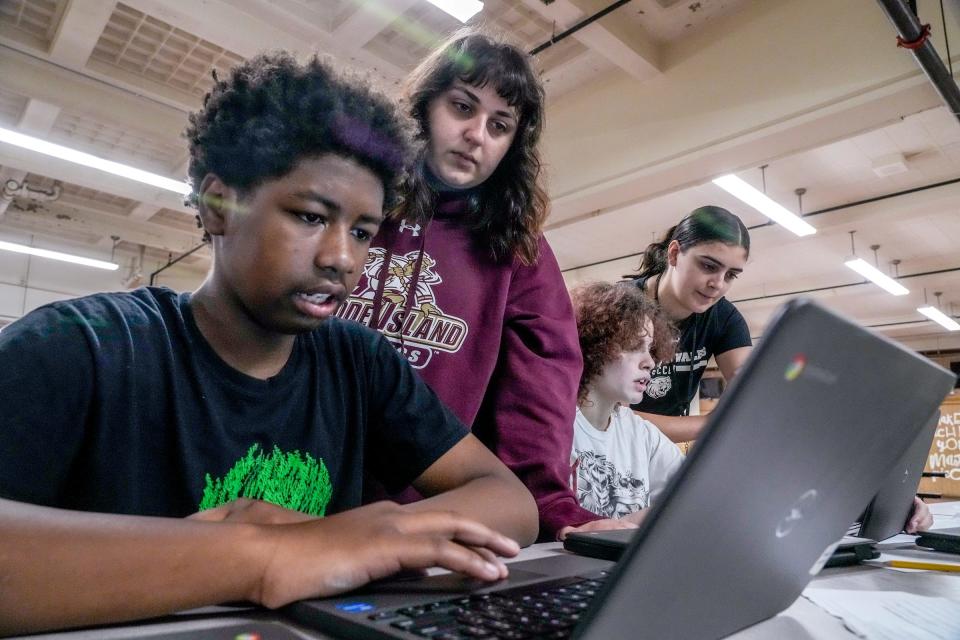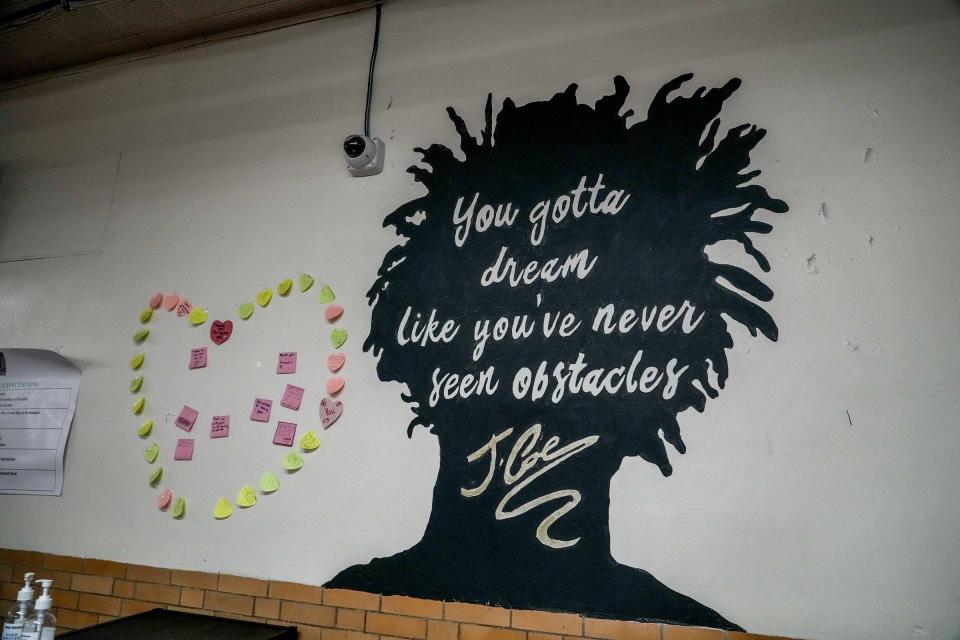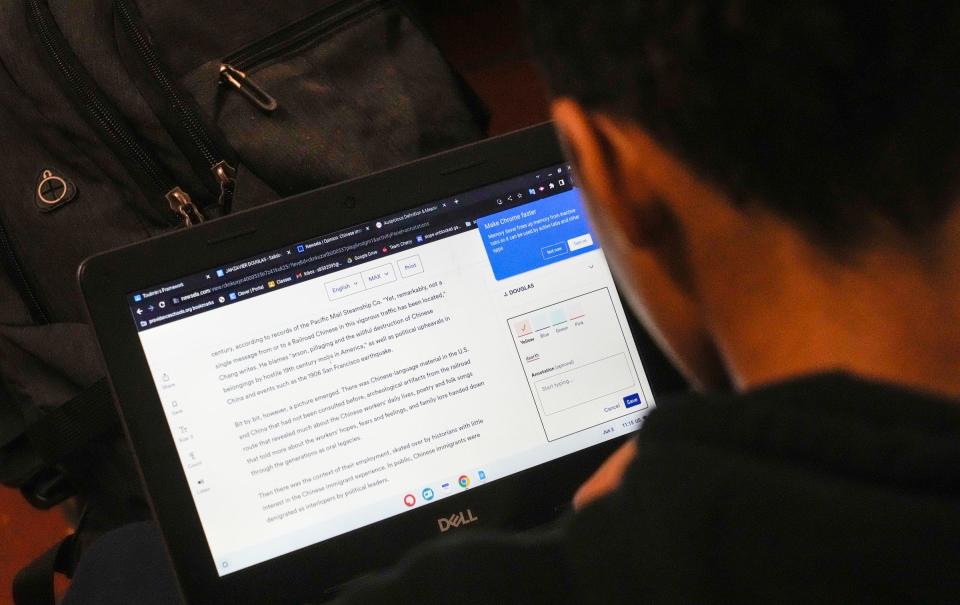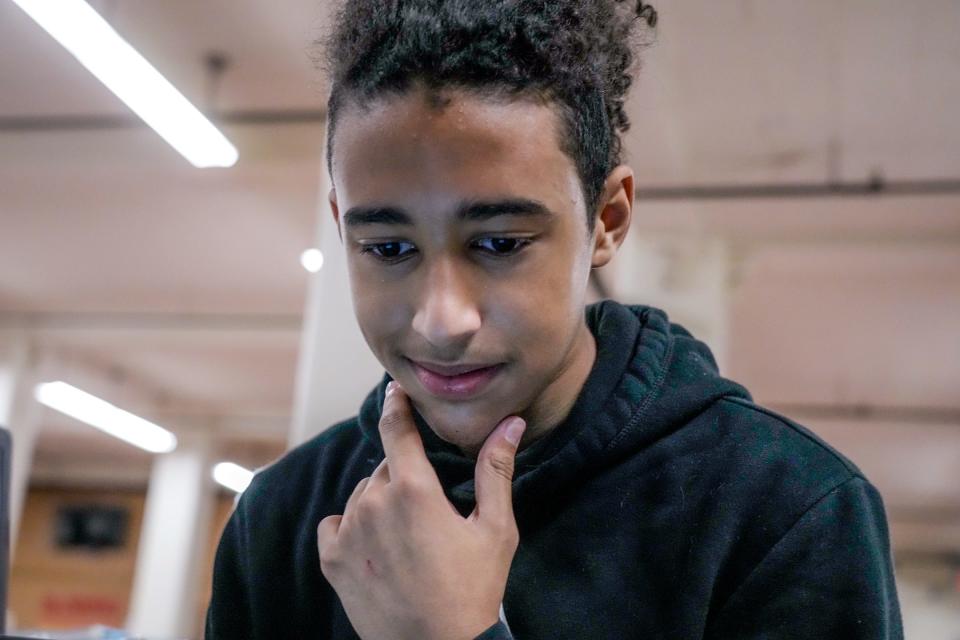These students were failing during the pandemic. Then a guidance counselor threw them a lifeline.
PROVIDENCE – One morning in the midst of the pandemic, Nathanael Greene Middle School counselor Lorice Daignault had an idea.
"I just had to get it out of my head," she recalled. "I came to work, I said, 'Listen, we've got to think outside the box here.'"
Daignault, who was watching kids struggle through classroom learning and struggle even worse to wrap their minds around virtual learning, wanted to start a tutoring program. It wasn’t novel, but it was a lifeline to rescue kids who were, as Daignault put it, "shutting down."
"It’s our only way to not have all these kids failing," she said. "Because everybody during COVID by that point was way failing. We were failing as a whole education system. It was systemic."
Report: RI students will need 3 to 5 years of accelerated learning to recover from COVID

Rhode Island students continue suffering academic setbacks from pandemic
In 2022, the National Center for the Improvement of Educational Assessment reported it would take up to five years for Rhode Island students to recover academically from the pandemic’s toll – an estimate that Education Commissioner Angélica Infante-Green cited again only weeks ago in explaining why many districts hadn't made bigger gains in a recent performance assessment.
Daignault and three educators banded together to try to make some headway with a "Saturday school," a tutoring program where students could receive homework help and catch up on assignments. It has been supported by $45,000 in federal pandemic relief funds intended to ease the impact of COVID-19 on students. The program is also supported by funding from the state's District Support Program, which aids vulnerable districts.
Since its inception, the program has grown to include paid tutors from area colleges who are recruited by nonprofit Coaching4Change. The Massachusetts-based organization scouts out a diverse array of participants with the aim of sending them to under-resourced schools with large classes where teachers can't always offer individualized help.

Saturday school offers help, but also connection
According to the National Center for Education Statistics, the school's student body identifies primarily as Hispanic, and with a significant Black population. The vast majority of students come from families facing economic hardships, and qualify for either free or reduced-price lunch programs.
Marquis Taylor, CEO of Coaching4Change, said the program's tutors have a variety of reasons for wanting to help – some having come from the places they're now watching struggle.
"The college students we’re attracting fall into three categories," Taylor said. "Either they want to pursue a career in social services … or they are interested in giving back to a community that they grew up in, and the third is there are a lot of young people that want to develop job skills through mentorship and service."
Kari Robles, who just graduated from Providence College with a degree in social science, said the Saturday school is a place not only for academic help, but also for human connection.
"There’s been conversations about race, identity, even [random things] like ice-cream flavors," Robles said. "Just getting to know them away from their academic responsibilities has been really cool."

Students carrying anxiety from pandemic, home lives and social media
Taylor emphasized that aside from academic issues, students are facing unprecedented anxiety from the pandemic and more.
"I think that young people today are exposed to more, whether it’s via social media, whether it’s isolation, whether it’s in the community," Taylor said. "Kids are growing up faster, and because they’re growing up faster and have access to so much information, they don’t necessarily know how to process it."
Mental and behavioral impacts: City of Providence sues Facebook, TikTok and other social media companies. Here's why.
Providence has already recognized this trend. In April, it became one of the latest U.S. cities to sue social media giants including Facebook, Instagram and TikTok. The suit, filed in U.S. District Court, alleged the companies were "ruthlessly seeking to maximize profits at any cost and with callous disregard for the harm that their platforms cause to minors’ mental and behavioral health."

While the Saturday school may be a refuge for children weathering both educational and personal difficulties, getting parents to make sure their kids attend has been a challenge, Daignault said.
At one point, thinking transportation might have been the reason for less-than-stellar turnout, she arranged for a bus to take students to their tutoring sessions. More than 100 families signed up for the extra schooling, yet only a couple of children boarded the bus.
By the end of the program earlier this month, Daignault saw 20 to 30 kids on an average Saturday, an underwhelming result compared to the level of interest families initially expressed.
"As a society, we have to at some point give the parents accountability," Daignault said. "This is your child’s education – not my child’s education – yours. And we’re offering all this for you. So how important is it?"
This article originally appeared on The Providence Journal: Providence Saturday school program was lifeline to kids on COVID slide

